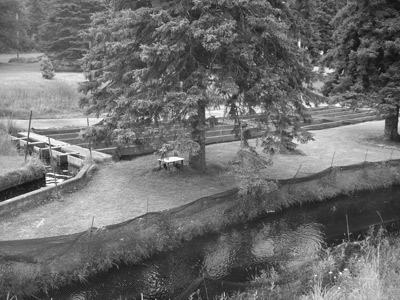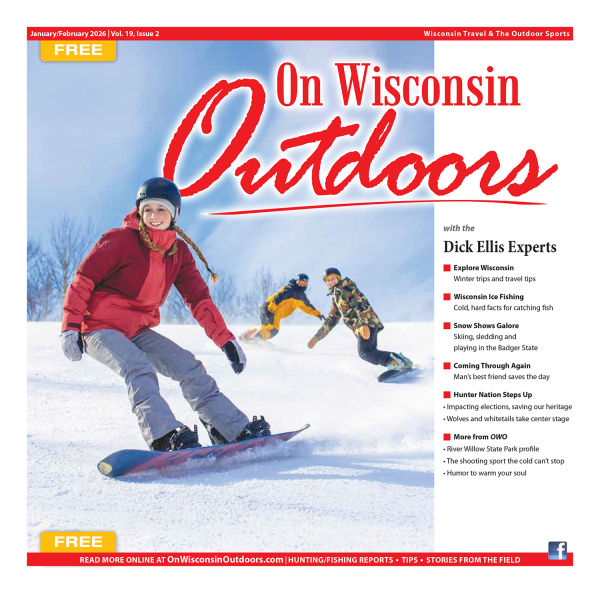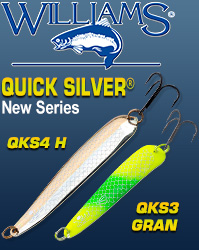The Politics Of A Fish Hatchery
By John Luthens
Preserving the historical Brule River State Fish Hatchery
The presidential election is about to take center on the grandest stage: hard fought campaigns, budget debates, maybe some finger pointing and mudslinging thrown in for good measure. No matter what side of the party fence you lean on, it promises to be a big-time political carnival.
But already this year, on a smaller scale—about the size of a newly hatched brown trout fry, to be exact—another political contest has already taken its turn in the spotlight. It may have lacked the drama of a presidential debate, but for those interested in the future of Wisconsin fisheries, the issue at hand was just as important.
The Fisheries Division of the DNR, faced with the task of trimming some $3 million from their budget, began looking at closing the Brule River State Fish Hatchery as a potential cost cutting measure. Three other state hatcheries have been shut down over the past six years, and the Brule Hatchery, perched in the far northwestern corner of the state, began to garner consideration as being next on the list.
Sportfishing organizations, local conservation clubs, as well as local community supporters, were worried about the potential DNR proposal. After a public meeting in April, concerned parties, including many citizens of the town of Brule, formed an action committee to try to save the hatchery.
State Senator Bob Jauch, D-Poplar, joined with State Representatives Janet Bewley, D-Ashland, and Nick Milroy, D-South Range, to draft a letter to DNR Secretary Cathy Stepp, urging her to consider the impact of closing the Brule hatchery.
Last year the hatchery raised 400,000 Coho salmon and brown trout for release into Lake Michigan and Lake Superior. In the letter, the elected officials spoke for the Brule community and the state in general, saying that downsizing the hatchery would result in losses to Wisconsin’s fisheries program that couldn’t be compensated for by other hatcheries.
They also stated that closing the hatchery would economically impact the state’s $3 billion sportfishing industry, along with 30,000 jobs and $196 million in local and state tax revenues that fishing provides annually in Wisconsin.
The historical and educational values of the hatchery, with its natural aesthetic surroundings, were also rallying points for the action committee to defend the hatchery.
The hatchery provides a unique hands-on learning experience on trout biology and fish-rearing dynamics. The concrete raceways and flowing ponds of the hatchery blend seamlessly into the surrounding pine and hardwood forests of the Brule River State Forest.

The raceways of the Brule River State Fish Hatchery.
It was built in 1927 with funds donated by the Douglas County Fish and Game League and was originally intended to ensure top quality trout fishing along the stretches of the Bois Brule River. In an election year twist of irony, the Bois Brule is informally known as The River of the Presidents, and has been visited by several sitting presidents over the course of its storied history.
The Brule Hatchery is linked to the Bois Brule through a spring-creek tributary to the Bois Brule. The creek provides in-line water that is well suited for the rearing of trout. But since the Brule River is also a tributary to Lake Superior, and since the discovery of VHS fish disease in the Great Lakes, the hatchery is only allowed to stock fish in waters known to already have tested positive for the disease. Biologically speaking, it is under quarantine.
The direct link with Lake Superior was a sticking point in DNR economic consideration. According to the Brule River Sportsman’s Club, estimates were put at around $10 million to update the hatchery and take it off-line from potential VHS contamination.
Members of groups such as Trout Unlimited, Apostle Island Sport Fishing, Western Lake Superior Troller’s Association, Brule River Sportsmen’s Club, along with the Brule Township, the Douglas County Chamber of Commerce and the Douglas County Board, began discussion on how to privately fund the hatchery if the DNR decided to close it.
I attended one of the action meetings at the Brule Ranger Station in July and was able to witness firsthand the politics involved in DNR state management. I had a personal interest in the hatchery, growing up in the area and knowing present and former managers of the fishery since I was first able to balance on the hatchery raceways.
I understand the financial burdens put on the DNR in these economic times. And what became clear to me as I followed this issue was that everyone involved in the action committee seemed to understand the underlying facts also.
Everyone I came across seemed willing to work toward an agreement for not only a short-term solution to the budget concerns, but also a long-term solution for the welfare of Wisconsin fish management.
Sportsmen’s clubs, along with local government, were willing to work raising capital, and they were open to the idea of increased licensing fees specifically marked for state fish hatcheries. The idea was raised that, if necessary, a volunteer core might help keep the Brule River Hatchery open. It was a slice of politics that focused on a realistic solution to the problem at hand.
Local sportsmen may be the best judges of the facts; they see them in the field on a regular basis. And if the government is willing to listen to sportsmen and their organizations, then I believe that is how our founding fathers designed our democracy to work.
After a summer of back-and-forth negotiations with the DNR, and after Secretary Stepp toured the Brule River facility, the end result of the Brule River Hatchery debate came in a press release from Senator Jauch, along with State Representatives Milroy and Bewley:
“We are pleased to announce that DNR officials have determined that the Brule Fish Hatchery shall remain in operation.”
The release concluded by saying, “Our citizens are ready to join hands with citizens across Wisconsin who are willing to make the necessary investments to support the $3 billion sport fishing industry and sustain a healthy fishery program long into the future.”
If this kind of local, small fish politics is catching, hopefully we’ll be in for a prosperous four years on a presidential level.









